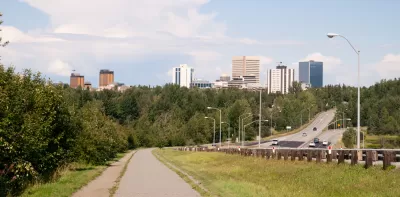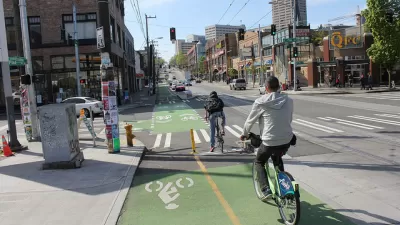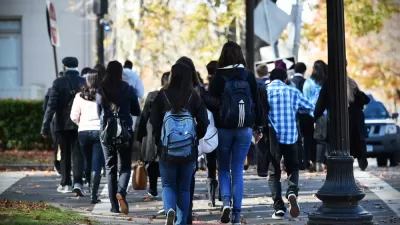Last year, Alaska returned $2.6 million of its 2013 Transportation Alternatives Program funding to the U.S. Department of Transportation due to a shortage of eligible projects to fund, despite having four years to obligate the grant money.

"The Transportation Alternatives Program, or TAP, provides federal funding for smaller-scale transportation projects such as pedestrian and bicycle facilities," reports Henry Leasia for Alaska Public Media.
[On a technical note, according to the U.S. Department of Transportation (DOT), the FAST Act "replaced the former Transportation Alternatives Program (TAP) with a set-aside of funds under the Surface Transportation Block Grant Program (STBG)" which they refer to as the 'TA Set-Aside.']
"Advocacy group Alaska Trails sent a letter to let Governor Bill Walker know that transportation funds are at risk," continues Leasia.
Each year the federal government authorizes TAP funds for every state that must be obligated to local projects within four years. Projects funded through TAP require a 20 percent state or local match.
Even though Alaska has the nation's lowest gas tax (12.25 cpg), the problem is not providing the 20 percent match, according to the Alaska Department of Transportation.
Alaska DOT spokesperson Jill Reese said that the 2013 TAP money was not obligated in time because there were not enough projects submitted from local stakeholders that were eligible for funding.
According to the Safe Routes to School National Partnership, nearly $4 million of Alaska’s TAP funding from 2014 could be returned to the federal government if it is not obligated by September 2017.
In addition to writing to Gov. Walker about the urgency of allocating the TAP funds, "Alaska Trails is working to to solidify both the Safe Routes to School Program (SRTS) and the Transportation Alternative Program (TAP) funding as a consistent funding streams for active transportation at the state level," according to its SRTS webpage.
In January, Planetizen editor James Brasuell reported that a problem with the former Transportation Alternatives Program (TAP) was that these funds, meant to fund bike/ped projects, were being regularly diverted to road projects.
FULL STORY: Alaska trail advocates warn Governor Walker of transportation funding lapses

Planetizen Federal Action Tracker
A weekly monitor of how Trump’s orders and actions are impacting planners and planning in America.

Maui's Vacation Rental Debate Turns Ugly
Verbal attacks, misinformation campaigns and fistfights plague a high-stakes debate to convert thousands of vacation rentals into long-term housing.

Restaurant Patios Were a Pandemic Win — Why Were They so Hard to Keep?
Social distancing requirements and changes in travel patterns prompted cities to pilot new uses for street and sidewalk space. Then it got complicated.

In California Battle of Housing vs. Environment, Housing Just Won
A new state law significantly limits the power of CEQA, an environmental review law that served as a powerful tool for blocking new development.

Boulder Eliminates Parking Minimums Citywide
Officials estimate the cost of building a single underground parking space at up to $100,000.

Orange County, Florida Adopts Largest US “Sprawl Repair” Code
The ‘Orange Code’ seeks to rectify decades of sprawl-inducing, car-oriented development.
Urban Design for Planners 1: Software Tools
This six-course series explores essential urban design concepts using open source software and equips planners with the tools they need to participate fully in the urban design process.
Planning for Universal Design
Learn the tools for implementing Universal Design in planning regulations.
Heyer Gruel & Associates PA
JM Goldson LLC
Custer County Colorado
City of Camden Redevelopment Agency
City of Astoria
Transportation Research & Education Center (TREC) at Portland State University
Jefferson Parish Government
Camden Redevelopment Agency
City of Claremont





























